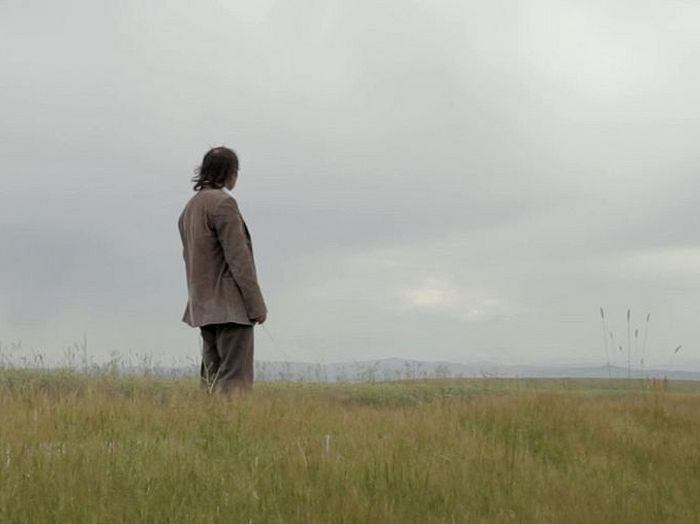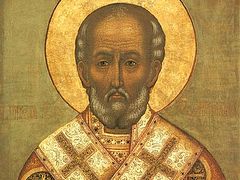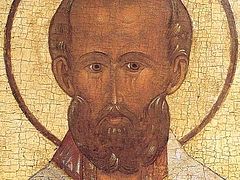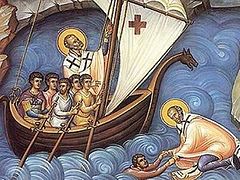“Everyone has his own way.” “The ways of the Lord are beyond knowing.” We often hear these phrases, but do we ever think about just how much these ways are beyond knowing?
In 2002, some friends and I decided to drive to Kronstadt. Our road lay through Yaroslavl province, by the town of Tutayev. We wanted very much to visit the Resurrection Cathedral there, and venerate the famous icon of the All-Merciful Savior. I had heard about this miracle-working icon. It is famous as an icon that you crawl under to receive a blessing. But no matter how hard we tried, we couldn’t persuade Tolya (short for Anatoly), who was the driver, to go there—he categorically refused to go to Tutayev. No begging or arguments helped. At the time I was very surprised at such stubbornness. But then a few months later Tolya told me his amazing story.
Anatoly appeared in the world in 1975, in the town of Lyskov, Nizhegorod province. He was born to an ordinary working-class peasant family. His mother, Elizaveta Petrovna, worked in a shop, and his father, Peter Borisovich, worked at the local factory as a welder and toolmaker. They lived from paycheck to paycheck, with very little money leftover. The autumn harvest from their garden helped get them through the winter.
Anatoly went to an ordinary public school. After the eighth grade he understood that he needed to receive a more serious education. The erudite, well-read Anatoly understood that the level of knowledge he could receive in Lyskov was catastrophically low.
After a brief family council, Anatoly decided to go to Nizhny Novgorod. His father rented him a tiny room on Malaya Yamskaya Street, periodically bringing him vegetables and money. Anatoly began studying in specialized school No. 13 (with an intensive English language program), and camped out in the library, where he literally absorbed the Russian and foreign classics, reading Losev, Soloviev, and Granin. He was interested in the works of Søren Kierkegaard. He ordered his day according to a special system of time management established by the remarkable biologist-entomologist A. A. Liubischev.
With the help of audiocassettes he perfected his English at night. The teachers at college would later wonder where a provincial boy got such magnificent pronunciation.
“I studied in school, in Lyskov,” Tolya would answer modestly.
Thus did ninth and tenth grade go by. In 1992, Tolya graduated with a gold medal.
In the same year he applied for entrance to the Moscow State Institute of International Relations in the department of international economic relations. Having passed his entrance exams with flying colors, he became a student in one of the most prestigious universities in the country.
He was an excellent student, and spent practically all his free time in the library. At first Tolya lived in the dormitory. But student life presupposes drinking parties with girls of rather “used” appearance and manners. This was not for him. So then he and his firend Sergei rented a one-room apartment. At night they swept the yard and walkways, and unloaded containers. On the weekends they would go to the sports club to practice karate. When he graduated from the institute, Anatoly had an upper degree brown belt in karate, just shy of a black belt.
In 1997, Tolya graduated from MSIIR with honors. He and Sergei started thinking about what to do next. The situation in the country in the late 1990s was, to put it lightly, not very auspicious. The factories were closing, and people were not receiving their paychecks for months on end. So the two friends decided that they needed to organize a business of their own. But for this they needed some initial capital, which they didn’t have. The two graduates of one of the most prestigious universities thought hard.
At that time there was a certain Andrei Trofimov, who was all over the television channels. The country was in a state of ruin. The stores were empty. People were living from hand to mouth. And suddenly on one TV program appears a man who says that in one month he earned… three million. He could make money from the air. Having become a millionaire himself he decided to teach others how to do the same. It was to him that Anatoly and Sergei directed their steps. They besieged the millionaire’s receptionist for almost two weeks, and finally there was a meeting appointed. When they walked into Andrei Vladimirovich’s office they felt a little shy. What if he kicks them out, what if he won’t help them? What will they do then? Who will they ask for help and support?
Trofimov was seated behind a massive desk make of natural oak, fingering prayer beads made of nephrite. Looking attentively at his visitors, he invited them to sit at the desk. His assistant brought them coffee in small, thin porcelain cups. Andrei Vladimirovich was the first to break the silence.
“I am listening, young men. How can I help you?”
“We want to start a business, but we don’t have the capital. We don’t have any money at all.”
Trofimov looked at them for a few minutes and said,
“I’ll help you. I won’t take any down payment from you. I will only take your honest word. Go to Moldavia; I will give you a recommendation letter for my friend and partner, Antony Iliescu. Take a railway container of wine from him. This will cost such-and-such an amount. Return to me the necessary percentage, and the ‘victuals’—they’ll be good—keep for yourself.”
That’s what they did.
Later Anatoly asked Trophimov, “Why did you give us money?”
“I saw your honest eyes and remembered myself when I was trying to earn at least a bit of money,” Andrei Trophimov answered simply.
Things improved very quickly. The friends’ wine business flourished. Anatoly bought a three-room apartment in Moscow, and a good foreign car. He sent part of his money to his parents. As a successful businessman, he travelled practically all over the world—he was in America, France, Spain, Germany… His money increased more and more. But wherever there is a lot of quick money there are always temptations. His life went spinning like in the movies: nightclubs, girls, drunken brawls, casinos. He was in no hurry to start a family—he hadn’t sown his wild oats yet, so he’ll live for today. He’s still young and his whole life is before him. One girlfriend replaced another, and “friends”—bandits—appeared on the scene.
One evening, as he was returning home after another successful deal, Anatoly stepped into the entranceway of his apartment building. He took the elevator to the eighth floor, walked over to his apartment, and reached for his keys. A shadow flickered by the stairwell. He raised the key to the lock… And that was the last thing he remembered. He regained consciousness in a dank, cold basement, handcuffed to a pipe. Darkness. Gradually his eyes became accustomed to the dark. He looked around and saw garbage everywhere, old rags, pieces of some broken pipes. Two “bulls” descended the stairs, apparently someone’s bodyguards. In their hands were cudgels. They beat him for a long time with good knowledge of their job. The pain was unbearable. They forced him to sign a release of his business. Anatoly lost consciousness. When he regained it there was some thin soup, a piece of bread, a spoon and some tea more resembling unsweetened dishwater on the floor next to him. As he later joked, “I lived the high life. The bodyguards turned out to be compassionate—they took me to the bathroom twice a day, and fed me soup. Sometimes they even brought me tea with sugar. It was like a health resort!”
Some time passed in this vein. Anatoly grew a beard and got lice. His clothing turned into tattered rags and hung on him like a scarecrow. He was skin and bones. The bodyguards came periodically to “bring him to reason” with the help of cudgels—but now not so severely. In order to get all the documents signed they needed him alive. After one of these “lessons” he finally gave in and signed all the necessary papers. As it became clear, he was signing everything over to an unknown person, an almost mystical personage.
Having received the long-awaited signature, the guards departed, locking the door tightly behind them. Sitting for a while with his eyes closed, Anatoly decided to stretch his swollen arms. But O the wonder! He could free his arm from the handcuffs! He had lost so much weight that after a few short attempts his hands slipped out of their bonds. Finding a steel reinforcement bar near him he thought, “Tomorrow when they bring me food I’ll hit him over the head, kill the guard, and get out of this basement.”
In the morning at the appointed time, one of the guards brought Anatoly some gruel, set it down next to him and turned to leave. Anatoly picked up the pipe and hit him. But from long sitting practically without movement he had become so weak that he missed and hit the guard on the shoulder, and that not very hard. The guard shouted and grabbed the pipe from Tolya. Then the second guard came down and together they beat Anatoly up and tossed him aside barely alive. Then they told him to get ready to die tomorrow. The boss had decided to get rid of him.
Tolya prayed to God all night; to God Whom he had forgotten after becoming a “big” man in Moscow. He remembered when he was a very little boy going to church with his grandmother in the village of Vorotynets. Grandma and grandpa lived in their house there, and Anatoly’s parents would send him there in the summer to live. He remembered how he and his deeply religious grandmother would to Vigil at the Church of the Icon of the Savior “Made Without Hands”; how he would wake up at night and see grandma on her knees before the icons with a perpetual lamp burning. He remembered Fr. Artemy blessing him, still a little boy, with his massive and work-worn hand. He saw batushka’s kind, affectionate eyes as if they were there before him, heard his gentle, as if singsong voice. Anatoly stood on his knees thanking God with tears that he had not become a murder, and asked His forgiveness. By morning he dozed a little and saw in a dream his grandmother. She was smiling, stroking him on the head, and telling him that everything would be alright…
He awoke at the grinding sound of the door opening. The guards had come. Releasing Tolya from the handcuffs, they led him upstairs. “Well, this is it,” he thought, “now they are going to kill me and my wasted life is going to end.” They took him outside. Anatoly winced, thinking it’s the end. Suddenly they gave him a strong kick in the behind and he fell face-first to the ground, tearing his lips and nose. He covered his head with his hands, waiting for the blows to fall. Nothing. After lying there for a time he tried to get up. He looked around—no one. He was standing alone on a kind of vacant lot next to a tumbledown house. Apparently they had kept him captive in this house. Swaying on his legs, he walked down the path and after some time entered a street. He was in tatters, dirty, hair overgrown, with no money, no identity documents, trying find out from passers-by what town this was. People leapt away from him like from the plague. Then an old man walked toward him. He had a large beard, and was wearing loose pants and a shirt something like a light windbreaker. On his head was a cap. Tolya ran to him.
“Grandpa, what town is this? Where am I?”
“You need to go to the post office sonny, and send your parents a telegram. Your mom and dad are likely to lose their minds. No word from you for three months. Your mom has about cried out both eyes.”
“Three months have gone by? How can that be?”
“Yes sonny, it’s almost summer. And you surely need a bath and a barber. But don’t forget the post office, go there first thing.”
“I don’t have any money or ID; how can I go to the post office or barber? And what town is this anyway?”
“You’ll find all that out when you get to the post office. They’ll tell you. I myself don’t really know what town this is.”
With this the old man took some money out of his pocket and gave it to Tolya. “Take it, sonny. I don’t have much money, but it’s enough for you right now. Well, go with God.”
“Thank you, grandpa. I don’t know how to thank you.”
“Don’t thank me, thank God. Well, goodbye for now; maybe we’ll see each other again sometime.”
The kind old man ambled further down the road, and Anatoly staggered to the post office. It is a miracle that the police never stopped him, looking like he did, and he never ran into one. Coming to the post office he asked what town it was. He heard the answer:
“What town? What, grandpa, have you forgotten? Tutaev it is.”
Tolya was bewildered. Apparently they had taken him to Yaroslavl province [just north of the Moscow region] and kept him there for three months.
After sending his parents a telegram he went to the public bath. There he also found a barber.
“Well, grandpa, how shall we cut your hair?” the swarthy and jolly hairdresser inquired.
“Just give me a shave and any kind of haircut. And if it’s possible, I’d like to wash my clothes,” said Anatoly.
“I think we’d do better to burn them, gramps, they’re downright frightful. We’ll find you something else.”
Zinaida—that was the kind hairdresser’s name—brought Tolya a pair of pants, an undershirt, a shirt, and some used shoes.
“Here, take these, gramps. People sometime bring us old things; put them on.”
Apparently they thought he was a vagrant, a bum, the number of which had been increasing recently. After shaving Anatoly’s beard Zinaida said, “Oy!”
“You’re not a grandpa at all! A young man! What happened to you!”
Anatoly quickly thought up a story to tell her. For some reason he didn’t feel like telling the truth, he didn’t want to remember it all again. He thanked the compassionate Zinaida with all his heart, remembering the old saying that “the world is not without kind people.” They said goodbye and he went to the train station.
The money that the old man had given Tolya was also enough for a ticket to Moscow. It was now nighttime, and as Anatoly lay on the third-class bunk listening to the clacking of the wheels, he understood who that old man was. Back then, in the cellar, in captivity, he had prayed fervently to St. Nicholas the Wonderworker and made a vow that if the God-pleaser gets him out of the cellar he’ll dedicate his life to God. Miraculously still alive, Anatoly understood that now his life belongs to God.
Arriving in Moscow, Anatoly sold his apartment and returned to Nizhny Novgorod. There he bought himself a small apartment.
For some time Anatoly helped in the restoration of churches. At that time many churches (which during soviet times were factories or bread bakeries) were being returned to the dioceses. He bought a small grocery shop and with the proceeds helped support the Church of the Resurrection of Christ. Fr. Valerian had begun the restoration work on this church. Later Fr. Valerian was transferred to the city of Kronstadt. Anatoly was the church’s treasurer. He purchased candles, icons, and even paid the priest’s salary with his own money. In a word, he helped in anyway he could. Thus did one year pass.
In 2004, Anatoly left for the village of Vvedenye, near the town of Shuya, to the St. Nicholas Shartomsk Monastery for men, where after some time, on the feast day of St. Nicholas the Wonderworker, he received the monastic tonsure and then became Hieromonk Nicholas. In this monastery, f. A., (former Anatoly as we jokingly call him) has been laboring in monasticism to this day. He also does missionary work, and has brought many lost souls back to God, back home.
Truly the Lord’s ways are beyond knowing. Wondrous are Thy works, O Lord! Glory to God for all things!




